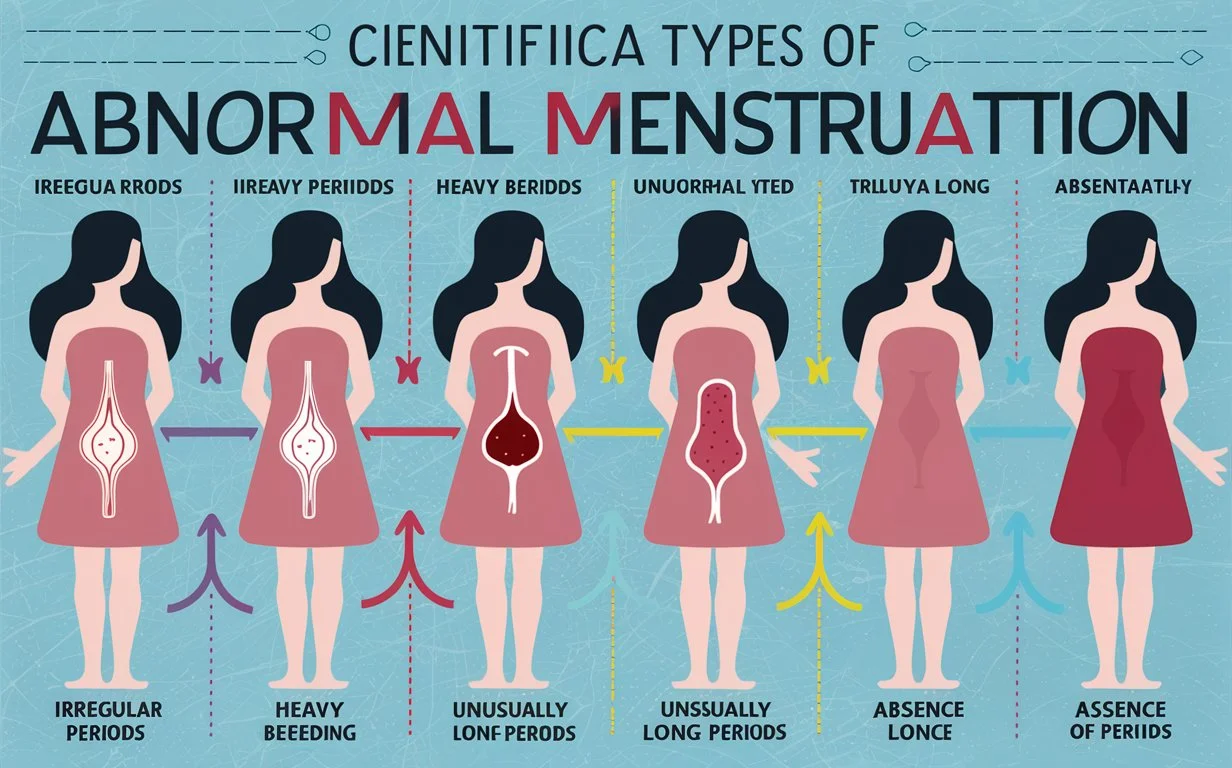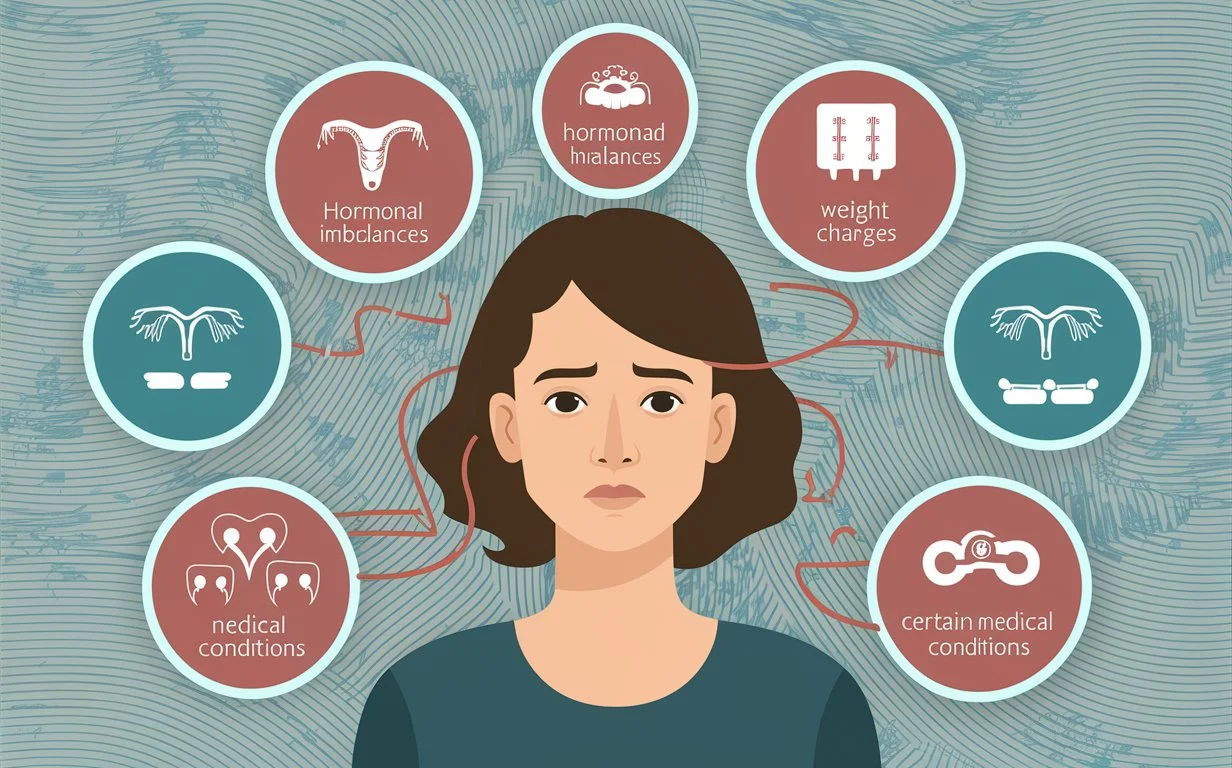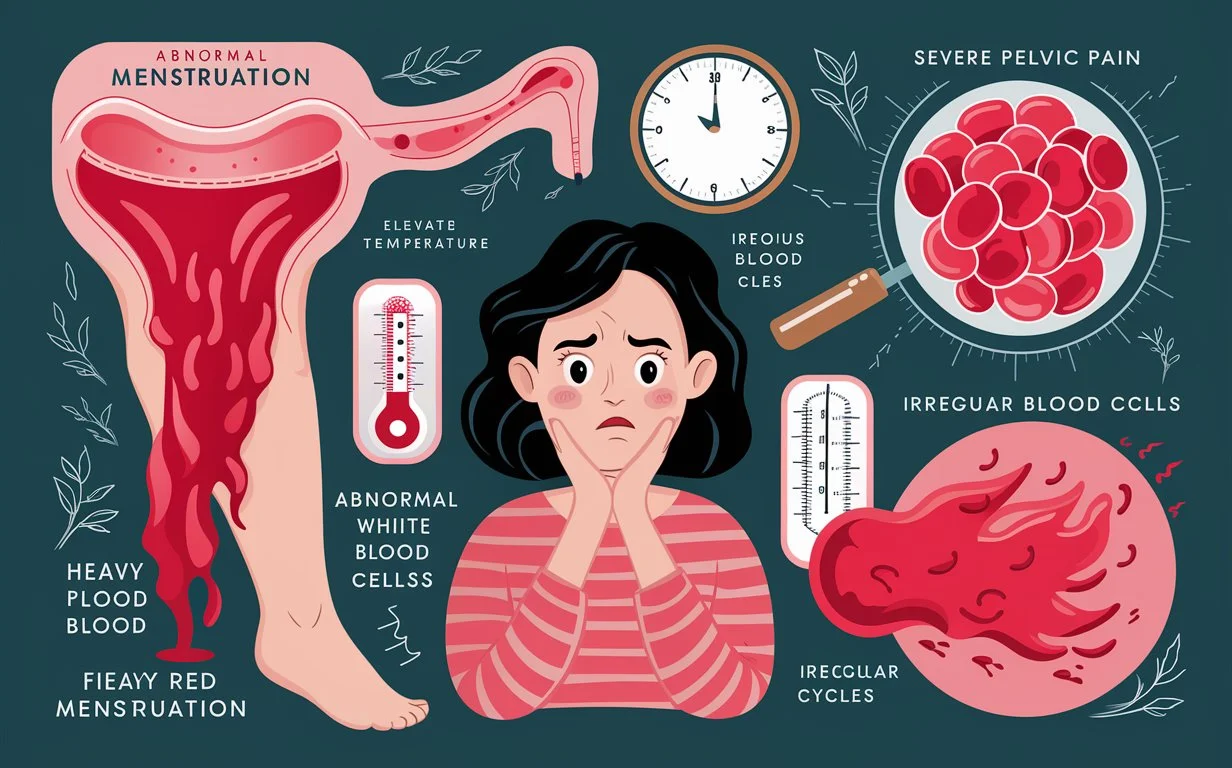8 Types of Abnormal Menstruation: Causes, Symptoms & Treatment
Understanding the basics of the menstrual cycle is essential for women’s health and well-being. It’s a natural biological process experienced by women of reproductive age, typically lasting around 28 days. Though variations are common, abnormalities in menstrual cycles can signal underlying health issues. Recognizing these variations, such as menorrhagia, oligomenorrhea, amenorrhea, dysmenorrhea, polymenorrhea, and metrorrhagia, is crucial. Monitoring menstrual patterns helps in early detection and management of potential health concerns, ensuring women’s overall health and quality of life.

Menstrual Cycle Basics
The menstrual cycle is a monthly series of physiological changes in a woman’s body. It typically lasts around 28 days, although variations are common. The cycle starts with menstruation, where the uterine lining sheds. This is followed by the follicular phase, during which follicles in the ovaries mature and prepare to release an egg. Ovulation occurs midway through the cycle when the egg is released into the fallopian tube. The luteal phase follows, during which the uterine lining thickens in preparation for pregnancy. If fertilization doesn’t occur, the cycle repeats. Hormonal fluctuations regulate these stages, orchestrating the complex interplay between the ovaries and the uterus.
Types of Abnormal Menstruation
Types of abnormal menstruation encompasses various irregularities in a woman’s menstrual cycle. Menorrhagia involves excessively heavy periods, while oligomenorrhea refers to infrequent menstruation. Amenorrhea is the absence of menstruation, often due to hormonal imbalances or stress. Dysmenorrhea causes severe menstrual cramps, affecting daily activities. Polymenorrhea is characterized by frequent, short menstrual cycles. Metrorrhagia involves irregular bleeding between periods. These abnormalities can result from hormonal imbalances, uterine fibroids, polycystic ovary syndrome (PCOS), or other underlying health conditions. Monitoring menstrual patterns and seeking medical advice is crucial for diagnosing and managing these issues effectively.

Amenorrhea
Amenorrhea refers to the absence of menstruation in women of reproductive age. It can be primary (never experiencing menstruation) or secondary (sudden cessation of menstruation).
Oligomenorrhea
Oligomenorrhea is characterized by infrequent or irregular menstrual periods, with cycles occurring at intervals greater than 35 days.
Menorrhagia
Menorrhagia involves heavy or prolonged menstrual bleeding that exceeds normal levels, often leading to discomfort and interference with daily activities.
Metrorrhagia
Metrorrhagia is the term used to describe irregular bleeding between menstrual periods, which may indicate underlying health issues.
Dysmenorrhea
Dysmenorrhea refers to painful menstrual periods, commonly accompanied by cramps in the lower abdomen and lower back.
Polymenorrhea
Polymenorrhea involves frequent menstrual periods occurring less than 21 days apart, often associated with hormonal imbalances.
Hypomenorrhea
Hypomenorrhea is characterized by unusually light menstrual bleeding, which may indicate hormonal irregularities or underlying health conditions.
Menstrual Disorders Associated with Hormonal Imbalance
Hormonal imbalances can lead to various menstrual disorders, including irregular cycles, abnormal bleeding, and other symptoms.

Causes of Abnormal Menstruation
Abnormal menstruation can be triggered by various factors, both physiological and environmental. Hormonal imbalances, such as those seen in polycystic ovary syndrome (PCOS) or thyroid disorders, often lead to irregular periods. Structural abnormalities in the reproductive organs, like uterine fibroids or polyps, can also disrupt menstrual cycles. Lifestyle factors, including extreme stress, excessive exercise, or significant weight fluctuations, may contribute to irregular menstruation. Certain medications or medical treatments, such as chemotherapy, can impact hormonal levels and affect menstrual patterns. Identifying the underlying cause is crucial for effectively managing abnormal menstruation and promoting women’s health.
Hormonal Imbalances
Fluctuations in estrogen and progesterone levels can disrupt the menstrual cycle, leading to irregularities in menstruation.
Stress
Chronic stress can affect hormone production and regulation, contributing to menstrual irregularities such as amenorrhea or oligomenorrhea.
Polycystic Ovary Syndrome (PCOS)
PCOS is a common hormonal disorder among women of reproductive age, characterized by irregular menstrual cycles, ovarian cysts, and hormonal imbalances.
Thyroid Disorders
Thyroid disorders, such as hypothyroidism or hyperthyroidism, can impact menstrual regularity due to their influence on hormone levels.
Uterine Fibroids
Uterine fibroids are noncancerous growths that develop in the uterus, potentially causing heavy or prolonged menstrual bleeding.
Symptoms and Signs of Abnormal Menstruation
Recognizing symptoms and signs of abnormal menstruation is vital for women’s health awareness. Heavy bleeding beyond the normal range, irregular cycles, or absence of menstruation (amenorrhea) are common indicators. Severe menstrual cramps (dysmenorrhea), bleeding between periods (metrorrhagia), or unusually short menstrual cycles (polymenorrhea) also warrant attention. Other symptoms include fatigue, dizziness, mood swings, and changes in appetite or sleep patterns. Any persistent deviation from a regular menstrual pattern should prompt a medical evaluation to identify underlying causes and ensure timely intervention for optimal health and well-being.

Irregular Cycle Lengths
Changes in cycle length, such as shorter or longer intervals between periods, may indicate underlying issues.
Excessive Bleeding
Heavy menstrual bleeding, requiring frequent changes of sanitary products, is a common symptom of abnormal menstruation.
Severe Cramping
Intense abdominal or pelvic pain during menstruation, interfering with daily activities, may signal underlying conditions such as endometriosis or fibroids.
Spotting Between Periods
Unexpected vaginal bleeding between menstrual cycles, known as spotting, should be evaluated by a healthcare provider.
Changes in Menstrual Flow
Alterations in menstrual flow, such as sudden increases or decreases in volume, warrant medical attention to rule out underlying causes.
Diagnosis and Treatment Options
Diagnosis and treatment options for 8 types of abnormal menstruation involve a thorough evaluation by healthcare professionals. Diagnostic tests may include blood tests to assess hormone levels, imaging studies like ultrasound to examine reproductive organs, or endometrial biopsy to evaluate uterine lining abnormalities. Once diagnosed, treatment options depend on the underlying cause. Hormonal medications, such as birth control pills or hormone therapy, can regulate menstrual cycles. Surgical interventions, like removal of fibroids or polyps, may be necessary for structural abnormalities. Lifestyle modifications, dietary changes, and stress management techniques also play a role. Tailored treatment plans aim to alleviate symptoms and restore menstrual health, promoting overall well-being.

Medical History and Physical Examination
Healthcare providers will conduct a thorough medical history and physical examination to evaluate menstrual irregularities and potential underlying conditions.
Diagnostic Tests
Diagnostic tests, including blood tests to assess hormone levels, pelvic ultrasound to detect structural abnormalities, and imaging studies, may be recommended for further evaluation.
Treatment Approaches
Treatment for 8 types of abnormal menstruation depends on the underlying cause and may include medications to regulate hormone levels, lifestyle modifications, or surgical interventions.
Prevention and Management
Preventing and managing of 8 types of abnormal menstruation involves a multifaceted approach aimed at addressing underlying causes and promoting overall well-being. Maintaining a balanced diet, regular exercise routine, and healthy weight can help regulate hormonal levels and promote normal menstrual cycles. Managing stress through relaxation techniques, such as yoga or meditation, can also have a positive impact. Medical interventions, such as hormone therapy or surgical procedures, may be necessary depending on the underlying cause. Regular check-ups with a healthcare provider are crucial for monitoring menstrual patterns and addressing any concerns promptly. Empowering women with knowledge about their bodies and menstrual health is key to prevention and effective management.

Adopting a healthy lifestyle, including balanced nutrition, regular exercise, and adequate sleep, can support menstrual health and overall well-being.
Stress Management Techniques
Implementing stress-reduction strategies such as mindfulness, relaxation techniques, and adequate rest can help mitigate the impact of stress on menstrual cycles.
Regular Exercise and Balanced Diet
Engaging in regular physical activity and consuming a balanced diet rich in fruits, vegetables, whole grains, and lean proteins can support hormonal balance and menstrual regularity.
Seeking Medical Advice
Women experiencing persistent or concerning menstrual abnormalities should seek medical advice for proper evaluation and management.
Choosing Premium Supplements from Warsan Homeopathic
At Warsan Homeopathic, we’re committed to providing men with premium-quality best vitamin supplements for men that address their unique health needs. Our extensive range of vitamin and herbal formulations undergoes strict quality control measures to ensure purity, potency, and safety. Whether you’re looking to support muscle health, boost cardiovascular function, enhance cognitive performance, or improve sexual vitality, we have a solution for you. With Warsan Homeopathic, you can trust that you’re investing in your health and well-being.

Conclusion
Understanding the various types of abnormal menstruation is essential for women’s health. By recognizing symptoms and seeking timely medical attention, individuals can address underlying issues and optimize their menstrual health and overall well-being.
FAQ's
Abnormal menstruation includes irregularities such as absent periods, infrequent cycles, heavy bleeding, and severe pain during menstruation.
Yes, chronic stress can disrupt hormone production and regulation, leading to menstrual irregularities such as amenorrhea or oligomenorrhea.
If you experience persistent or concerning menstrual abnormalities, such as irregular cycle lengths, excessive bleeding, or severe cramping, it's important to consult a healthcare provider for evaluation and management.
Healthcare providers may conduct a medical history, physical examination, and diagnostic tests such as blood tests, pelvic ultrasound, or imaging studies to diagnose menstrual disorders and identify underlying causes.
Treatment for abnormal menstruation depends on the underlying cause and may include medications to regulate hormone levels, lifestyle modifications, or surgical interventions tailored to individual needs.



